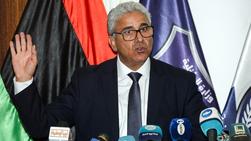 A file photo taken on July 28, 2020 shows Fathi Bashagha, then Interior Minister of Libya's UN-recognised Government of National Accord (GNA), addressing a press conference at the Tajura Training Institute, southeast of the GNA-held capital Tripoli. (MAHMUD TURKIA / AFP)
A file photo taken on July 28, 2020 shows Fathi Bashagha, then Interior Minister of Libya's UN-recognised Government of National Accord (GNA), addressing a press conference at the Tajura Training Institute, southeast of the GNA-held capital Tripoli. (MAHMUD TURKIA / AFP)
A leading candidate to become Libya’s first elected president vowed to pursue a fairer deal for the country’s east to permanently end a decade of conflict.
The feud between the politically dominant west and oil-rich east fueled years of political wrangling and war in the OPEC member following the ouster and killing of autocrat Muammar Qaddafi in 2011.
“The east doesn’t just want a bigger share of oil revenues, they demand equal rights and a fair share of state services and development,” said Fathi Bashagha, former interior minister in the internationally recognized government in Tripoli.
The feud between the politically dominant west and oil-rich east fueled years of political wrangling and war in the OPEC member following the ouster and killing of autocrat Muammar Qaddafi in 2011
“Their complaints are real, this state is centralized and more than half of the budget stays in the capital,” he said in an interview June 3. Bashagha narrowly failed to become interim prime minister in February under a United Nations-sponsored peace initiative and will contest elections to pick a president set for Dec 24.
The distribution of Libya’s oil wealth has been a major source of tension and a sticking point in several previous attempts to restore stability. Eastern military commander Khalifa Haftar, who’d attempted to take Tripoli by force, blockaded leading ports to halt oil exports. The UN stepped up its peace mission as that war drew in regional powers Turkey, Egypt and the United Arab Emirates.
ALSO READ: Libya calls on Turkey to help evacuate foreign forces
Oil production has risen to more than 1.3 million barrels a day from almost zero in September, just before an interim cease-fire was made permanent.
Bashagha, who’s from the western city of Misrata and survived an assassination attempt earlier this year, said if elected he’d revive projects worth more than 20 billion dinars (US$4.5 billion) that date to before the 2011 uprising that removed Qaddafi. They include upgrading infrastructure and building more schools and hospitals.
Security needs to be strengthened nationwide but especially around oil installations if Libya wants foreign companies to return and help develop the sector, he said. Total SE, Eni SpA and Repsol SA all have stakes in the country but withdrew overseas staff as conflict escalated from 2014.
Violence didn’t end with the truce agreement. Islamic State militants claimed responsibility for a Sunday car bomb in the southern city of Sebha, 125 miles (200 kilometers) west of Libya’s largest oil field, that killed at least one senior police officer, Libya 218 news website reported.
READ MORE: Libya lawmakers approve first unified govt since 2014
Bashagha said he was optimistic that a nation tired of conflict could achieve peace. “Everyone wants the same thing: no war and a united Libya.”


